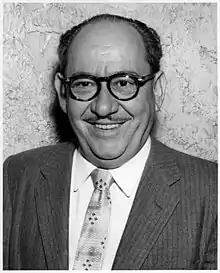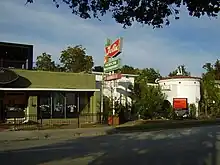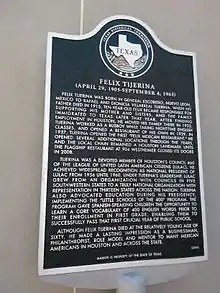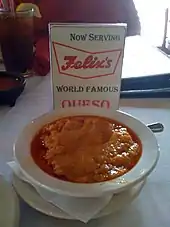Felix Tijerina
Felix Tijerina (1905–1965) was a Mexican-American restaurateur, activist, and philanthropist in Houston, Texas. He served as the 25th president of the League of United Latin American Citizens.
Felix Tijerina | |
|---|---|
 | |
| 25th President of the LULAC | |
| In office 1956–1960 | |
| Preceded by | Oscar M. Laurel |
| Succeeded by | Hector Godinez |
| Personal details | |
| Born | 1905 General Escobedo, Nuevo León, Mexico |
| Died | 1965 |
History


Tijerina was born in General Escobedo, Nuevo León, Mexico;[1] He had claimed to have been born in Sugar Land, Texas.[2] In 1918 he became a busboy at the Original Mexican Restaurant, the first Tex-Mex restaurant in Houston. Tijerina taught himself English and became a friend and associate of the owner of the restaurant. Tijerina became the manager of the restaurant, located in what is now downtown Houston.[3]
Tijerina opened his own restaurant in 1929. In a fashion similar to his mentors, Tijerina described his restaurant's food as authentic, but catered the food to the tastes of white Americans. The Great Depression forced the closure of his first restaurant.[4] Tijerina became a beer truck driver. His wife, Janie, gambled on a horse and won, allowing the family to start the restaurant a second time.[5] Tijerina started another restaurant in 1937 in what is now the Neartown area of Houston. Tijerina opened other restaurants in other locations. In addition Tijerina became prominent in Houston politics. He became friends with many politicians, including Lewis Wesley Cutrer, Roy Hofheinz, and R.E. "Bob" Smith, and was the first Mexican American to serve on the board of the Houston Housing Authority. In 1956 Tijerina became the national president of the League of United Latin American Citizens (LULAC) and served four consecutive annual terms. He started LULAC's Little School of the 400 program, intended to teach English to non-English speaking children before they entered school.[4]
Robb Walsh of the Houston Press said that "Tijerina's story is a study in assimilation. His mission was to help Mexican-Americans merge into the American mainstream as successfully as he had" and that "Early Mexican restaurants like Felix's were among the first institutions where urban Anglos and Hispanics rubbed elbows. Tijerina's Americanized version of Mexican cooking was what brought the races together. And it was a triumph of diplomacy."[3] Walsh added that Tijerina's style of cooking "was not about bringing authentic Mexican flavors to Texas; it was about putting Anglos at ease with things Mexican."[3] Walsh stated that "His floury chili gravy and fluffy chili con queso were not far from brown gravy and cheese dip, and the spicing of his sauces was nonconfrontational to the delicate Anglo palate."[3]

Tijerina died in 1965. Janie took over the operations of the restaurant chain, Felix Mexican Restaurants. In 1971 the chain had six restaurants in Houston and one in Beaumont.[6] The last Felix's restaurant, located in Montrose, closed in 2008.[7] After the closure, Scott Sullivan, an owner of the El Patio Mexican Restaurant chain, reached an agreement with Felix Tijerina Jr. to license Felix's name and recipes, which led to Felix's chile con queso becoming a permanent addition to El Patio's menu.[8][9]
Walsh compared Felix's food to "scratchy recordings of the Delta blues", as in it was an illustration of the history of an evolving cuisine.[10]
Legacy
Felix Tijerina Elementary School, a Houston Independent School District campus which opened in 1979 to serve the Central Park community, was named after Tijerina.[11]
See also
Notes
- Kreneck 172.
- Kreneck 81.
- Walsh, Robb. "Combination Plates." Houston Press. 1. Retrieved on November 16, 2009.
- Walsh, Robb. "Combination Plates." Houston Press. 2. Retrieved on November 16, 2009.
- Staff. "Restaurateur Janie Tijerina dies at age 88." Houston Chronicle. Tuesday March 4, 1997. A19. Retrieved on January 13, 2011.
- Gonzales, J.R. "Felix Mexican Restaurant." Houston Chronicle. April 9, 2010. Retrieved on January 13, 2011.
- Walsh, Robb. "Felix Mexican Restaurant Closes After 60 Years in Business." Houston Press. Friday March 21, 2008. Retrieved on November 26, 2009.
- Hank Moore (2015). Houston Legends: History and Heritage of Dynamic Global Capitol. James Publishing. p. 80. ISBN 9781630474690. Retrieved 30 July 2015.
- Katherine Shilcutt (30 June 2014). "Houston's 15 Best Tex-Mex Restaurants". Houstonian Magazine. SagaCity Media Publications. Archived from the original on 10 July 2015. Retrieved 29 July 2015.
- Walsh, Robb. Texas Eats: The New Lone Star Heritage Cookbook, with More Than 200 Recipes. Potter/Ten Speed/Harmony/Rodale, 6 March 2012. ISBN 160774113X, 9781607741138. p. 119.
- "About Tijerina Archived 2010-11-08 at the Wayback Machine." Felix Tijerina Elementary School. Retrieved on November 16, 2009.
References
- Kreneck, Thomas H. Mexican American Odyssey: Felix Tijerina, Entrepreneur and Civic Leader, 1905-1965. Texas A&M University Press, 2001. ISBN 0-89096-936-1, ISBN 978-0-89096-936-6. Link at Google Books.
Further reading
- "Felix Tijerina and an Expanding Civic Elite." The Houston Review 1, no. 2 (2004): 34.
- Gray, Lisa (2014-08-05). "Felix's queso: Cheesy, greasy and beloved". Houston Chronicle.
External links
- Gonzales, J. R. "Felix Mexican Restaurant." Houston Chronicle. April 9, 2010.